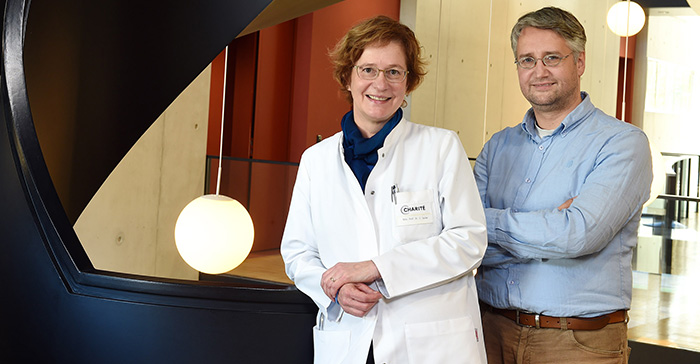Professor Simone Spuler, MD, and Dr. Stefan Kempa explore rare muscle disorders

In many cases, it is not yet possible to treat muscle disorders because the causes of muscle loss (dystrophy) have not yet been sufficiently elucidated. This is true for the around 400 genetic muscle diseases, each of which is rare, but also for age-related muscle loss or degradation due to chronic diseases, which are much more common. The department “Muscle Sciences and University Outpatient Clinic for Muscle Disorders” at the Experimental and Clinical Research Center (ECRC) has therefore specialized in the diagnosis of muscular dystrophies, in the conduct of clinical trials and in long-term care for patients suffering from muscle diseases.
Professor Simone Spuler, MD, head of the university outpatient clinic, is exploring the cellular mechanisms that lead to muscle wasting. Her main research interest is to understand the metabolism in the muscle cells. The ECRC, as an institution of the Charité and the Max Delbrück Center for Molecular Medicine (MDC) offers unique conditions for this. In collaboration with the biochemist Dr. Stefan Kempa and his MDC research group at the Berlin Institute for Medical Systems Biology (BIMSB), the focus is on the study of the metabolism using state-of-the-art methods. Dr. Kempa’s research group has built up an excellent technology platform for integrative proteomics and metabolomics*, where methods have been developed to analyze the metabolism in muscle cells in a differentiated way. To collect and interpret these data requires experts who can connect clinical and basic research as well as bioinformatics.
The research is based on extensive clinical data and muscle cells derived from patients of the university outpatient clinic. Samples of their muscle cells are removed in the operating room of the neighboring HELIOS Klinikum and rushed to the ECRC lab. The close proximity and the expertise in processing ensure that the metabolites and the RNA are preserved and that suitable stem cells can be isolated. Thus, for the first time in this way, the researchers have exposed living cells in the cell culture to specific metabolic stimuli and have measured the effect of these stimuli in a dynamic and time-resolved manner. For one form of muscular dystrophy that is related to mutations in the dysferlin gene, the researchers were able to detect at which step in the metabolism the responses do not function properly. From these data, the researchers were directly able to derive a therapeutic intervention.
*Metabolomics denotes a new approach in metabolic research, which considers the metabolic characteristics holistically – taking into account conversion rates, interaction and spatial and temporal separation of individual metabolic pathways. Genetic and microbial factors are also considered. Since the used and collected metabolomics data are extremely complex, sophisticated biological and mathematical analysis methods are required.
all stories research